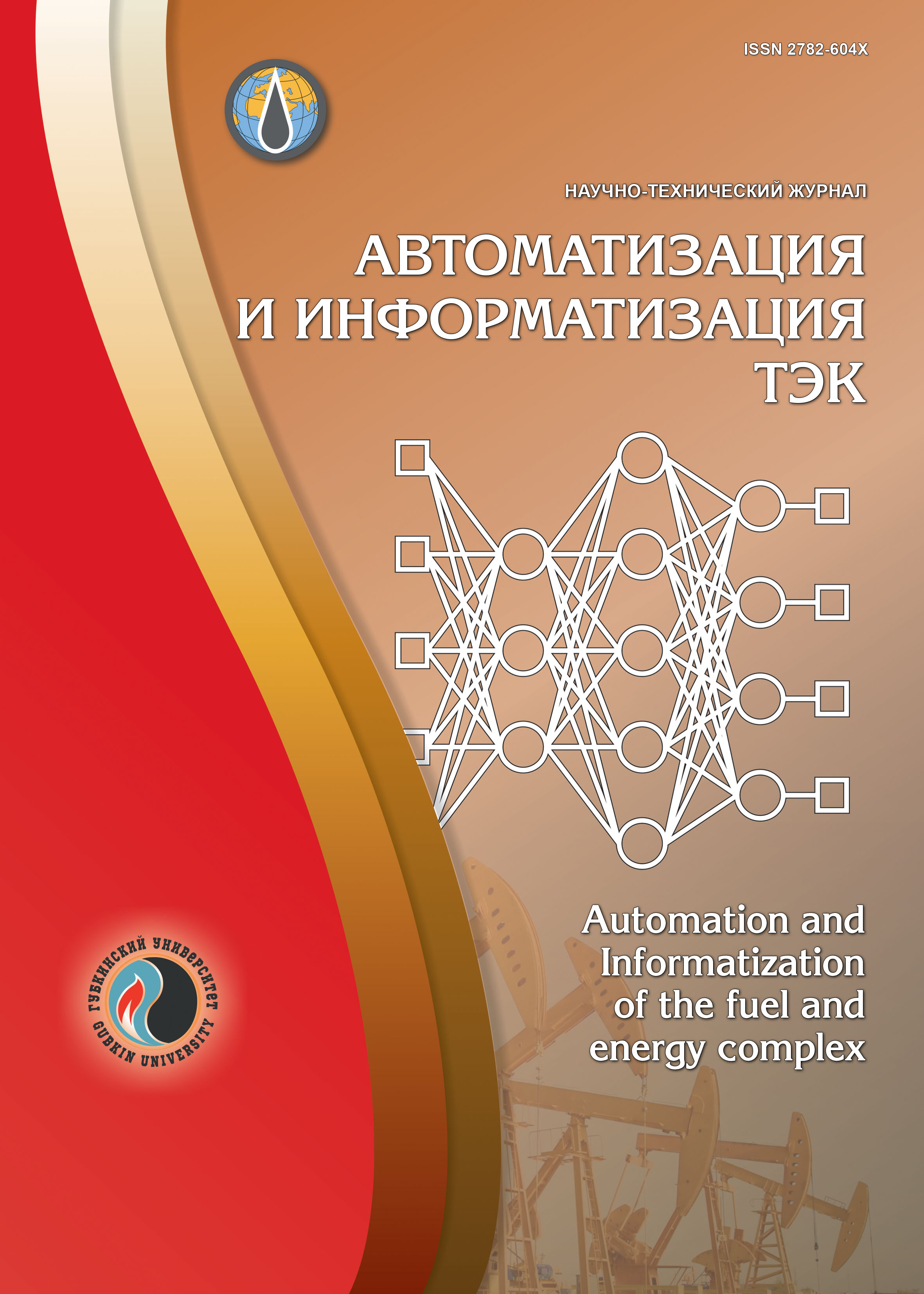Scientific and technical journal
«Automation and Informatization of the fuel and energy complex»
ISSN 0132-2222

Improvement of intelligent control systems architecture
UDC: 681.5:62-503.5
DOI: 10.33285/2782-604X-2023-4(597)-15-22
Authors:
1 Fedorovsky Polar State University, Norilsk, Russia
2 Tyumen State University, Tyumen, Russia
3 State Agrarian University of the Northern Trans-Urals, Tyumen, Russia
4 Tyumen Industrial University, Tyumen, Russia
Keywords: intelligent control system, automation system, hybrid system, dataflow architecture, architecture of dataflow
Annotation:
The article considers the features of the ongoing changes in the architecture of intelligent control systems which occur due to the development of technologies. Attention is paid to the evolutionary development of automation – the emergence of hybrid systems of discrete and continuous dynamics of the information data array. Such systems include new forms and methods of data transmission. They are designed on the basis of new intelligent controllable devices. When building such systems, special attention is paid to the dataflow architecture. It is noted that the modern development of the automatic control theory is at an evolutionary stage of the information systems development, when solutions to problems are made on the basis on the knowledge base, taking into account the needs of the user and other features and components. The article discusses the features of the "difficulty hypothesis" for intelligent control systems. Methods for its partial solution are proposed, which allow improving the data flow architecture on a practical level.
Bibliography:
1. Varlamov O.O. Mivarnye bazy dannykh i pravil. – M.: INFRA-M, 2021. – 351 s. – DOI: 10.12737/15086652. Kobrinskii B.A., Yankovskaya A.E. The problem of convergence of intelligent systems and their submergence in information systems with a cognitive decision-making component // Open Semantic Technologies for Intelegent Systems. – 2020. – No. 4. – P. 117–122.
3. Printsipy funktsionirovaniya intellektual'noy sistemy dinamicheskogo kontrolya faktorov riska i formirovaniya rekomendatsiy po zdorov'esberezheniyu / B.A. Kobrinskiy, A.S. Kadykov, M.G. Poltavskaya [i dr.] // Profilakticheskaya meditsina. – 2019. – T. 22, № 5. – S. 78–84. – DOI: 10.17116/profmed20192205178
4. Shchitova A.A. Intellektual'nye sistemy VS sistemy iskusstvennogo intellekta: novyy ponyatiyno-kategorial'nyy apparat // Pravo i gosudarstvo: teoriya i praktika. – 2021. – № 4(196). – S. 306–308. – DOI: 10.47643/1815-1337_2021_4_306
5. Sansyzbay L.Zh., Orazbayev B.B. The development of the model of the intelligent system on the basis of fuzzy sets for microclimate control of building // Bulletin of the Karaganda University. Mathematics Series. – 2019. – No. 4(96). – P. 109–117. – DOI: 10.31489/2019M4/109-117
6. Petrov A., Popov A. Computer Vision Technology in the Development of an Ultrasonic Repeller // Lecture Notes in Civil Engineering. – 2021. – Vol. 130 LNCE. – P. 447–458. – DOI: 10.1007/978-981-33-6208-6_44
7. Petrov A., Popov A., Molotok A. Development of a laboratory installation of a digital measuring system for visualization of internal pipeline processes // J. of Physics: Conf. Series. – IOP Publishing Ltd, 2020. – Vol. 1614. 2019 Int. Scientific Conf. Energy Management of Municipal Facilities and Sustainable Energy Technologies (EMMFT 2019), Voronezh, Dec. 10–13, 2019. – P. 012036. – DOI: 10.1088/1742-6596/1614/1/012036
8. Borovkov A.I., Ryabov Yu.A. Tsifrovye dvoyniki: opredelenie, podkhody i metody razrabotki // Tsifrovaya transformatsiya ekonomiki i prom-sti: sb. tr. nauch.-prakt. konf. s zarubezhnym uchastiem, SPb., 20–22 iyunya 2019 g. / pod red. A.V. Babkina. – SPb.: S.-Peterb. politekhn. un-t Petra Velikogo, 2019. – S. 234–245. – DOI: 10.18720/IEP/2019.3/25
9. Intellektual'nye informatsionnye sistemy i tekhnologii: ucheb. posobie / Yu.Yu. Gromov, O.G. Ivanova, V.V. Alekseev [i dr.]. – Tambov: TGTU, 2013. – 244 s.
10. Ostreykovskiy V.A. Informatika: ucheb. dlya vuzov. – M.: Vysshaya shk., 2009. – 510 s.
11. Lutsenko E.V. Intellektual'nye informatsionnye sistemy: ucheb. posobie dlya studentov spetsial'nosti 230400 "Informatsionnye sistemy i tekhnologii". – Krasnodar: KubGAU, 2013. – 645 s.
12. Makarenko S.I. Intellektual'nye informatsionnye sistemy: ucheb. posobie. – Stavropol': SF MGGU im. M.A. Sholokhova, 2009. – 206 s.
13. Umanov A.A., Bikbulatova N.G. Issledovanie Dataflow-arkhitektury // Tr. Severo-Kavkazskogo fil. MTUSI. – 2017. – № 1. – S. 479–487.
14. Salibekyan S.M., Panfilov P.B. Voprosy avtomatno-setevogo modelirovaniya vychislitel'nykh sistem s upravleniem potokom dannykh // Inform. tekhnologii i vychisl. sistemy. – 2015. – № 1. – S. 3–9.
15. Barskiy A.B., Mel'nik D.I. Neyrosetevaya model' tseleraspredeleniya dlya vychislitel'noy sistemy arkhitektury data flow // Inform. tekhnologii. – 2019. – T. 25, № 7. – S. 441–448. – DOI: 10.17587/it.25.441-448
16. Kolenteev N.Ya., Sharlay A.S. Nepreryvno-determinirovannye matematicheskie modeli (D-skhemy) i diskretno-determinirovannye matematicheskie modeli (F-skhemy) // Spetsial'naya tekhnika i tekhnologii transporta. – 2020. – № 8(46). – S. 386–393.
17. Petrov A., Popov A. Application of computer vision technology in the development of ultrasonic repeller // E3S Web of Conf. – Moscow: EDP Sciences, 2020. – Vol. 164. Topical Problems of Green Architecture, Civil and Environmental Engineering (TPACEE 2019), Moscow, Nov. 20–22, 2019. – P. 06013. – DOI: 10.1051/e3sconf/202016406013
18. Petrov A.M., Popov A.N. Laboratornye ispytaniya izmeritel'no-vychislitel'nogo kompleksa dlya diagnostiki termodinamicheskikh protsessov odnofaznykh potokov // Innovatsii i investitsii. – 2022. – № 7. – S. 81–85.
19. Petrov A., Popov A. Visualization of physical and mathematical models of thermodynamic processes of single-phase flows using MATLAB to diagnose the condition of external heat supply networks // J. of Physics: Conf. Series. – IOP Publishing Ltd, 2021. – Vol. 2131. Intelligent Information Technology and Mathematical Modeling 2021 (IITMM 2021) – Mathematical Modeling and Computational Methods in Problems of Electromagnetism, Electronics and Physics of Welding, Divnomorskoe, May 31 – June 06, 2021. – P. 052069. – DOI: 10.1088/1742-6596/2131/5/052069
20. Opredelenie sostavlyayushchikh informatsionnogo potoka v sisteme monitoringa zagryazneniya atmosfernogo vozdukha promyshlennogo regiona / V.M. Panarin, N.A. Rybka, A.A. Maslova, S.A. Savinkova // Ekolog. sistemy i pribory. – 2021. – № 6. – S. 9–14. – DOI: 10.25791/esip.06.2021.1231